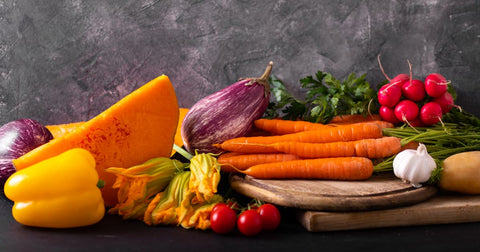Are you tired of the same old broccoli and cauliflower? Or perhaps these cruciferous veggies wreak havoc on your digestion? Fear not, veggie lovers! The world of vegetables is vast and diverse, offering a plethora of delicious and nutritious options beyond the cruciferous family. Let's delve into seven non-cruciferous vegetables that pack a nutritional punch and are gentler on your gut.

Cruciferous Definition and Cruciferous Meaning: What's the Deal?
Before we dive into our top picks, let's clarify what "cruciferous" actually means.
- Cruciferous Family: This group of vegetables belongs to the Brassicaceae family and includes broccoli, cauliflower, cabbage, Brussels sprouts, kale, and collard greens.
- The Sulfur Connection: Cruciferous veggies are known for their sulfur-containing compounds, which can be beneficial for health but also cause gas and bloating in some individuals.
Top 7 Non-Cruciferous Vegetables: Expand Your Veggie Repertoire
1. Sweet Potatoes:
These vibrant orange root vegetables are loaded with beta-carotene, a precursor to vitamin A, crucial for healthy vision and immune function. They're also a great source of fiber, vitamin C, and potassium.
2. Carrots:
Another root vegetable powerhouse, carrots are packed with beta-carotene and fiber. They're also a good source of vitamin K1, essential for blood clotting and bone health.
3. Spinach:
This leafy green is a nutritional superstar, offering a wealth of vitamins and minerals like iron, folate, and vitamin K. It's also low in calories and high in fiber, making it a great choice for weight management.

4. Bell Peppers:
Bursting with vitamin C, bell peppers are also a good source of antioxidants and other nutrients. Their sweet and crunchy texture adds a delightful element to salads, stir-fries, and fajitas.
5. Zucchini:
This versatile summer squash is low in calories and carbs, yet surprisingly high in fiber and vitamin C. It's a fantastic addition to soups, stews, or grilled as a side dish.
6. Eggplant:
A unique and flavorful vegetable, eggplant is rich in fiber, antioxidants, and vitamins like potassium and folate. It's delicious roasted, grilled, or used in dishes like eggplant parmesan.
7. Mushrooms:
While technically fungi, not vegetables, mushrooms offer a range of nutrients like selenium, potassium, and B vitamins. They're also a good source of fiber and can add a meaty texture to vegetarian dishes.

Non-Cruciferous Vegetables: A Bounty of Benefits
Incorporating a variety of non-cruciferous vegetables into your diet can offer numerous health benefits:
- Improved Digestion: Many of these vegetables are gentler on your gut compared to their cruciferous counterparts. They can help reduce bloating and gas, especially if you have sensitivities.
- Enhanced Nutrient Intake: By diversifying your vegetable choices, you ensure a broader range of vitamins, minerals, and antioxidants for optimal health.
- Reduced Inflammation: Colorful vegetables are packed with anti-inflammatory compounds, helping protect your body from chronic diseases.
Could a Food Intolerance be Causing Digestive Distress?

If you experience bloating, gas, or other digestive issues even with a healthy diet, it's worth considering a food intolerance.
- Uncover Hidden Triggers: Our premium food sensitivity test can identify specific foods that might be causing your discomfort, allowing you to make informed dietary choices and achieve a healthier, happier gut.
The Takeaway
While cruciferous vegetables offer numerous health benefits, exploring the world of non-cruciferous options can be a game-changer, especially for those with sensitive stomachs. By incorporating these nutrient-rich vegetables into your meals and addressing any underlying food intolerances, you can nourish your body, optimize your digestion, and embrace a wider variety of flavors and textures in your diet.
Frequently Asked Questions:
1. I have IBS. Can I eat carrots without worrying about triggering my symptoms?
Yes! Carrots are considered low FODMAP, so they are generally well-tolerated by people with IBS. However, it's important to stick to moderate portions (about 1/2 cup or 75 grams) to avoid any potential discomfort.
2. Are cooked carrots also low FODMAP?
Absolutely! Cooking carrots doesn't change their FODMAP content. You can enjoy them steamed, roasted, or boiled without worry.
3. Are baby carrots a good option for a low FODMAP diet?
Yes! Baby carrots are simply smaller versions of regular carrots and are equally low FODMAP. They're a convenient and healthy snack choice.
4. What if I don't like carrots? Are there other low FODMAP vegetables I can enjoy?
Absolutely! Many vegetables are low FODMAP, including bell peppers, zucchini, eggplant, cucumbers, and leafy greens like spinach.
5. Can I drink carrot juice on a low FODMAP diet?
Yes, in moderation. A small glass (4-6 ounces) of carrot juice is generally considered low FODMAP. However, larger amounts could contain more mannitol, a type of FODMAP sugar that might cause issues for some people.


.png?v=1737390083)
.png?v=1737187409)


